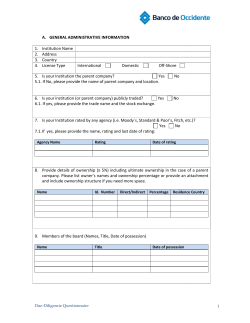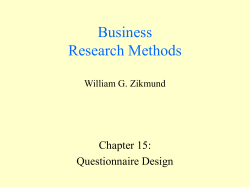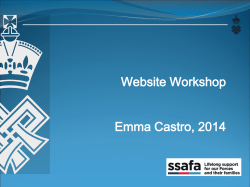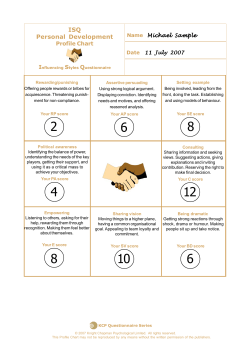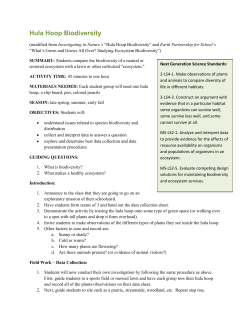
The costs and success of revegetation in Australia and the potential for achieving multiple outcomes for biodiversity and carbon
The costs and success of revegetation in Australia and the potential for achieving multiple outcomes for biodiversity and carbon A PhD project with the Environmental Decisions Group at The University of Queensland and Ecosystem Sciences at CSIRO Investigator: Valerie Hagger, Email: v.hagger@uq.edu.au, Phone: 0401 392 704 Participant Information Sheet Background and significance Investment in revegetation is critical to prevent further loss and decline of biodiversity, reverse environmental damage, sequester atmospheric carbon and provide ecosystem services. We already know that revegetation is characteristically time and resource‐intensive, and often has a low likelihood of success due to ecological, societal and financial factors. There are however few national‐level data on either costs or failure rates. The possibility that desired outcomes will not be realised is seldom considered in planning for revegetation, largely due to a lack of data. Carbon farming through the national carbon accounting system presents an opportunity to finance revegetation to sequester carbon in vegetation and soils. Depending on the type of revegetation, carbon farming has the potential to deliver biodiversity and financial benefits alongside carbon abatement. The revegetation type, however, needs to achieve biodiversity benefits and be economically viable under a varying carbon price. Over recent decades, we have developed and refined decision support tools to prioritise investments in restoration and assess the economic viability of restoration in carbon farming, but such tools are only as useful as the data on which they rely. Better data on costs and success are needed to improve revegetation outcomes. Accounting for the possibility of failure will likely influence the sites that are prioritised for revegetation, when and how revegetation should occur, and help predict what can be achieved in the long term. Objectives of the research Our overall objective is to investigate the costs and likelihood of success of revegetation (e.g. environmental plantings and assisted natural regeneration) for Australia’s major terrestrial vegetation types, and the co‐benefits for biodiversity and carbon outcomes. Eliciting expert knowledge from restoration practitioners across Australia involved in revegetation of terrestrial vegetation communities is a critical component of our research. It will provide us with important insights on the motivations and perceptions of individuals from different organisations and geographic regions involved in revegetation at different stages, and initial data on revegetation methods, costs and success. This information will be used for the purpose of improving revegetation outcomes. The specific objectives are to: identify motivations for undertaking revegetation; identify perceptions on the drivers and constraints influencing likelihood of success; identify revegetation methods, costs and success for major terrestrial vegetation types; and identify the biodiversity benefits of different revegetation techniques. 1 Methods We recognise the issue of “survey fatigue” and that many restoration practitioners may have already been asked to provide information on revegetation, in particular costs, for various reasons. Because of this, we have designed a research approach that is targeted towards eliciting valuable knowledge specific for the objectives of our research, and kept as short as possible. Semi‐structured interviews have been undertaken with restoration ecologists nationally to scope the issues and current research on revegetation, and inform development of a draft questionnaire. Regional focus groups have been undertaken with restoration practitioners to explore the issues and refine the questionnaire to ensure it is contextually relevant. The questionnaire will collect data on specific variables we wish to analyse regarding revegetation motivations, perceptions, costs and success. What to expect The questionnaire will be emailed to individuals from organisations involved in revegetation across Australia. A fixed set of short‐answer questions will be ‘self‐administered’ via an online questionnaire. The questionnaire should take approximately 30 minutes to an hour to complete (depending on the level of information provided), but participants will be given three months from when the questionnaire is sent to complete online. This should allow ample time for any enquiries about the research to be made and for participants to complete the questionnaire. It is important to recognise that we learn from our mistakes, and that accepting failure and learning from it are an integral part of adaptive management. We would therefore appreciate responses on the negative or unexpected outcomes of revegetation as well as the positive. This provides an opportunity to investigate what did not work and why, which is just as important as hearing about what did work. You are under no obligation to participate, may withdraw at any time and will not get paid for participating. You will be asked to provide your consent at the commencement of the questionnaire. After all the responses have been analysed, participants will be sent a summary of results and will be invited to comment on the findings. Confidentiality Responses will be recorded on a secure database and will be kept confidential. Any information provided will only be used for the purposes of this research. Responses will contribute to a pooled dataset for scientific analysis and no individual responses will be published or made available. Personal information will not be identified in the research. Personal information will only be used for the purpose of contacting participants to provide a summary of results, clarify answers or to participate further in the research project where participants are willing. Investigators will correspond with each participant individually. Further information You are welcome to discuss your participation in this research with the investigator, Valerie Hagger (Phone: 0401 392 704; Email: v.hagger@uq.edu.au) or her academic supervisors, Dr Kerrie Wilson (Phone: 07 3365 2829; Email: k.wilson2@uq.edu.au) or Dr John Dwyer (Email: j.dwyer2@uq.edu.au) at any time. This study adheres to the Guidelines of the ethical review process of The University of Queensland and the National Statement on Ethical Conduct in Human Research. Whilst you are free to discuss your participation in this study with project staff, if you would like to speak to an officer of the University not involved in the study, you may contact the Ethics Coordinator on (07) 3365 3924. If you require any special assistance in participating in the research, please contact us to discuss arrangements. 2
© Copyright 2025
